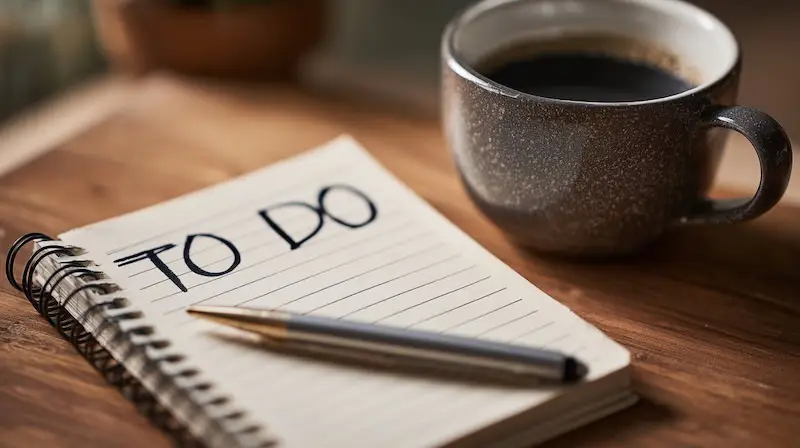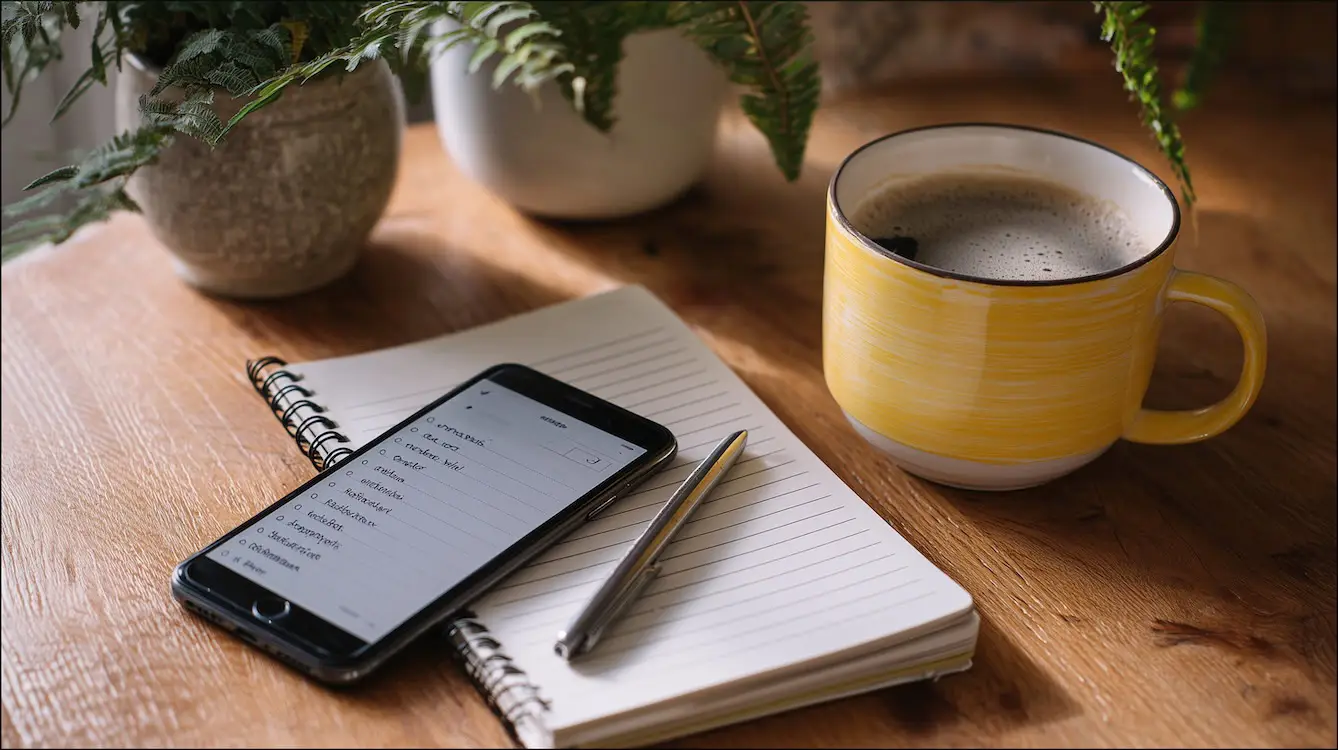Organisation isn’t about being perfect; it’s about bringing calm and clarity to everyday life. When your home, time, and plans feel under control, your days run more smoothly. Being organised helps you make better decisions, reduce stress, and find time for what matters most. You don’t need to overhaul your entire routine; start with a few small habits that make daily life easier. Using simple tools and voice assistants like Alexa, Siri, or Google Assistant makes staying organised easier than ever.

Ten Ways To Be More Organised Every Day
1. Begin with a daily reset: Spend ten minutes each morning or evening returning items to their places, clearing surfaces, and preparing for the next day. This quick ritual helps prevent clutter from accumulating and brings a sense of calm. You can even say, “Alexa, remind me to tidy up at eight o’clock,” or ask Siri to set a recurring reminder so it becomes a habit.
2. Plan your week: Choose one day each week to review what’s coming up. Make a simple list of meals, errands, appointments, and priorities. A clear view of the week helps you avoid last-minute stress and forgotten jobs. You can add events to your phone calendar by voice, such as “Hey Google, add dentist appointment on Tuesday at ten.”
3. Keep only what you need: Excess items cause visual and mental clutter. Tackle one drawer, cupboard, or shelf at a time and let go of things you do not use. Store items where they are actually used, and consider digitising essential papers so you can find them later without creating clutter.
4. Use one system for tasks and notes: Having reminders in multiple places can be confusing. Choose a method that works best for you. It might be a notebook by the kettle or a phone app such as Google Tasks or Apple Reminders. You can even ask Alexa to “add bread to my shopping list” or “remind me to post the parcel tomorrow.”
5. Develop small routines: Routines save time and make life more predictable. For example, plan to do laundry on the same day each week, clean the kitchen after dinner, or prepare lunches the night before work. These small habits eliminate daily decisions and help keep your home running smoothly.

6. Batch similar tasks together: Grouping similar chores helps you accomplish more without feeling rushed. Run errands in one trip, reply to messages at a designated time, or cook several meals at once. Some AI apps, such as Motion, can even automatically group digital tasks to free up your attention.
7. Streamline your digital space: Phones, laptops, and inboxes can quickly become cluttered. Remove unused apps, organise your home screen, and clear downloads. Use built-in innovative tools, such as Apple Photos or Google Photos, to automatically group and label pictures, making them easier to find.
8. Create space in your day: Organisation isn’t about doing more, it’s about making room. Leave short gaps between tasks, appointments, or errands to allow for relaxation or regrouping. You can even ask your voice assistant to remind you to take breaks or stretch.
9. Set boundaries with your time: decline extra commitments when you’re already busy. Guarding your schedule helps you stay relaxed and enjoy your chosen activities. Many calendars now feature focus settings that automatically block quiet time, preventing any bookings from overlapping.
10. Reflect and adjust frequently: Every few weeks, pause to assess what is working and what feels chaotic again. Organisation evolves with your lifestyle, so it’s normal to make tweaks. Use notes, journaling apps, or voice memos to record what keeps you balanced.
Tried and Tested Methods Worth Exploring
Some organisational systems withstand the test of time because they help life run more smoothly. The 5 AM Club promotes early starts for movement and reflection, while Time Blocking divides the day into focused periods. The Pomodoro Technique utilises 25-minute bursts of concentrated work followed by brief breaks to maintain focus. SMART goals, introduced by George T. Doran in 1981, remain one of the most effective frameworks for setting clear and achievable objectives. They assist you in turning ideas into action by ensuring they are Specific, Measurable, Achievable, Relevant, and Time-bound. Whether you’re planning work, tidying your home, or improving routines, combining these methods provides structure, motivation, and genuine progress.
AI Tools and Apps That Can Help You Stay Organised
Artificial Intelligence, or AI, refers to computer programmes that can learn your habits and assist you in managing tasks. Many everyday apps now incorporate simple AI features that make life a little easier. Here are a few to try:
Alexa (Amazon Echo): A voice assistant that listens to spoken commands. You can ask Alexa to add things to your shopping list, remind you of birthdays, set timers, or start daily routines like “morning prep” or “evening wind down.”
Google Assistant: Built into Android phones and Google Home speakers. You can say, “Hey Google, remind me to water the plants every Wednesday,” or “What’s on my calendar tomorrow?” and it will respond instantly.
Siri (Apple): The Apple voice assistant integrated into iPhones, iPads, and Macs. You can ask Siri to set reminders, send messages, or create lists using simple voice commands.
Google Tasks or Microsoft To Do: Both are free list-making apps that help you track errands, reminders, and goals. They can send you notifications at specific times or locations, so you never forget to repurchase milk.
Notion or Todoist: All-in-one organisation apps that combine notes, lists, and planning tools. Their AI features can suggest priorities, summarise your tasks, or schedule jobs automatically.
You only need one or two tools that genuinely make life easier. Start with the simplest option, such as Alexa or Apple Reminders, and add more if you find them useful.
Final Notes On Getting Organised
Becoming organised is not about control; it is about comfort. When your home, schedule, and mind feel orderly, life slows down in the best way. You can think clearly, rest properly, and enjoy more of your day. The key is to start small, stay consistent, and use tools that lighten your load rather than add to it. Whether that means a notebook on your kitchen counter or asking Alexa to remind you about bin day, each small habit builds towards a calmer, more balanced life.
Frequently Asked Questions About Self-Organisation
What is the simplest way to become more organised?
Start with one area that feels untidy or overwhelming, such as your kitchen counter or digital inbox. Spend ten minutes each day tidying it, and then gradually extend to other areas as it becomes easier.
Do I need to be tech-savvy to use Alexa or AI tools?
No, most are designed to be simple. You can start with voice commands like “Remind me to buy milk” or “Add bins to my calendar.” They become easier the more you use them.
Can being organised really reduce stress?
Yes. Having systems in place makes daily life smoother, lessens decision fatigue, and helps you feel more in control.
What if I live with others who are not organised?
Focus on your own habits first. Clear your personal spaces and lead by example. Minor improvements often encourage others to join in.
How long does it take to notice the benefits?
You may notice a difference within a week or two after starting simple routines, such as daily resets and weekly planning. Gradually, these small actions become second nature.
We like these articles: Efficient App: Best to do list apps 2025 and My Life Organised: 16 best personal daily to do list apps of 2025. You might also like this article: Which home organisation method suits you best?
